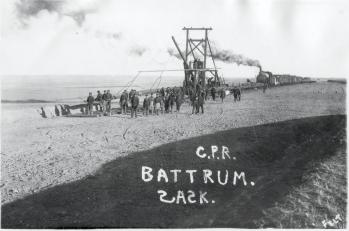
The Canadian Pacific Railway (CPR) Company was incorporated on February 16, 1881. Primarily serving only a small portion of Canada at the time, it became nationally significant after the company purchased the Canada Central Railway on June 9 of the same year: this 409- km addition connected the CPR to Ottawa, giving it a dominant presence in eastern Canada. Once it was firmly established in the east, the CPR planned to expand in the west. Much of the CPR’s success in this regard has been attributed to its first president, William Cornelius Van Horne: while he was working in the United States, the CPR offered Van Horne $15,000 a year to become the corporation’s general manager and oversee the expansion of the CPR into the west; he accepted the offer and managed the CPR into a nationally recognized carrier.
The CPR line ran through what is now Saskatchewan in 1882-83. In addition to its mainline running from east to west, the CPR branched northward: it accomplished this by purchasing the Qu’Appelle-Long Lake and Saskatchewan Railroad and Steamboat Company. The Regina to Prince Albert line was completed in 1889–90. In answer to persistent demands by settlers and businesses from communities adjacent to the railway, the CPR proceeded cautiously, building feeder lines only when there were prospects for profitable returns—if not immediately, then at least in the foreseeable future. The CPR linked Canada from east to west when the last spike was driven by Donald A. Smith (later Lord Strathcona and Mount Royal) at Craigellachie, British Columbia on November 7, 1885. In later years the CPR became involved in land sales, communications, shipping, hotels, insurance, irrigation, manufacturing, mining, pulp and paper, trucking, and even waste management. In 1941 the CPR became involved in commercial aviation by acquiring and amalgamating ten commercial aviation companies into Canadian Pacific Airlines (CPA). Today the CPR operates and maintains over 22,500 km of rail line in Canada, hauling grain, fertilizer, automobiles and freight to numerous destinations throughout the country.
Ted Regehr